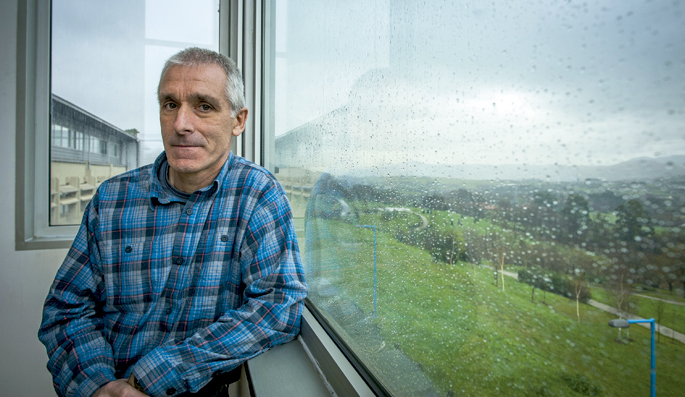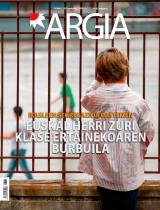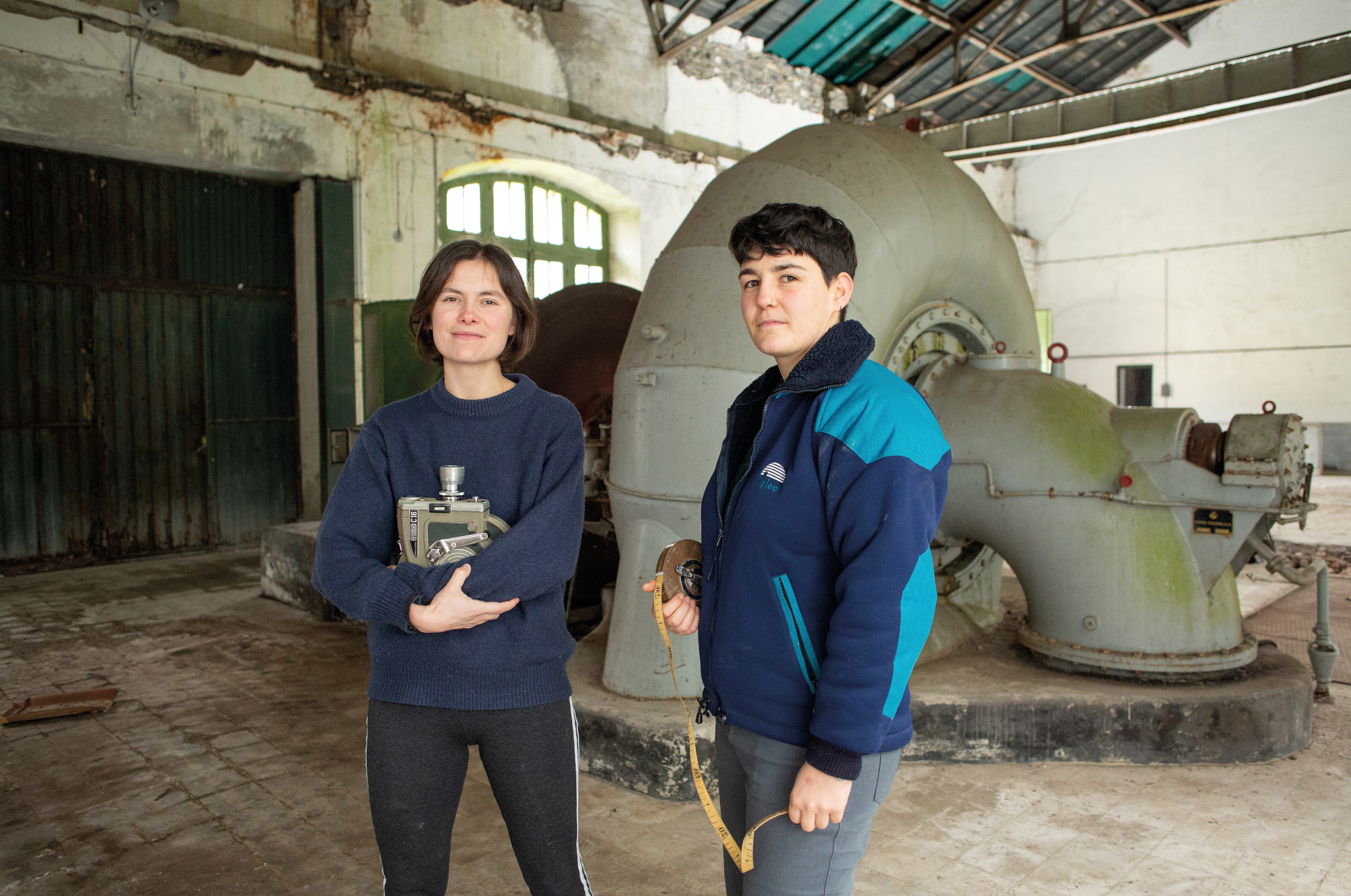"All rivers in northern Bizkaia, Gipuzkoa and Navarre are diverted and cannot function well"
- Arturo Elosegi is a researcher and professor of ecology from the Ecology of the Rivers group of the UPV/EHU. It has been researching ecosystem services for many years, i.e. the life that is generated around river waters and the benefit that this entails for society. Lately, the Ecology of the Rivers group is concerned about the effects of new pollutants: the drugs we take more and more are already affecting the rivers. Sex changes in fish have also been detected in other research groups.

What are you working on in the research group Ecology Fluvial?
We work the river as an ecosystem. We are interested not only in whether the water is pure or not, but also in how the present biodiversity (algae, invertebrates, fish) works in the functioning of the river ecosystem. The river is an ecosystem service that benefits society.
Does it change a lot from one side to the other?
The ecosystem service has emerged from a totally anthropocentric point of view and varies according to our activities. What rivers give us changes with society. A liter of water costs a lot more where there are a lot of people, so yes, services change from territory to territory. These values are often not taken into account. For example, a few years ago we debated the value of the Natural Park of Aiako Harria; until then most of the works emphasized the value of wood produced in the park, but we saw that the park provides hundreds of times more money in water than in wood. This is an ecosystem service, providing clean water. In other times they were very clear. The City Hall of Donostia-San Sebastian bought Artikutza a hundred years ago to have enough water, and as a consequence of the care of the basin today there is the cleanest water in the world and the greatest biodiversity in the Basque Country.
We would be very happy to see the river’s waters clean.
The point is that the functioning of rivers is affected by many human activities: forest holdings, changes in flow, drainage (for drinking, for hydroelectric plants...). All the rivers of Bizkaia, Gipuzkoa and northern Navarre are diverted, bear a small part of the flow that they would need and cannot function properly.
What do we do to recover the flow that we take from the rivers?
There are many situations. Imagine that in Gipuzkoa we have over 900 dams! Some of them are from medieval mills or 19th-century factories, and they don't use them. It's just the hurdles of rivers, many species can't move through the fragmentation of streams. Many of these obstacles can be dismantled by connecting river sections. On the other hand, we have many hydroelectric plants. Some give great performance, others, however, have a huge impact, but they barely generate electricity. It would have to be seen who deserves to maintain and review the flow that they have to give to the river, as they may have a greater or lesser impact.
“We can decide to live 12,000 million people, like the current Ghanaians, or much less, but like the Americans.”
Has the Administration internalized river recovery policies?
If you've been conscious, but I think you feel a lack of strength; society doesn't see it that easy. One example: the largest dam that has been thrown here was the Leitzaran River in Inturia, in Andoain, which for a long time had served no purpose, with a height of 12 metres. When it was decided to throw it out, many neighbours in the area were very much against it. They were used to the dam well. It is therefore not just a matter of raising awareness of the responsible administration, but of transforming society as a whole.
We remember the rivers when they bring dirty water or when they are urioles.
We Europeans have a very wrong perception of nature. For us the landscape is a very clean, very tidy golf course. How many times is it said that the “forest is dirty” because “it has a lot of scrubs”, or have we complained about dead wood from the rivers without realizing the benefit it brings to the river? In most cases, flooding is not caused by the dirt of the river, but by the occupation of the margins. Recently, there have been many floods in the Urumea, in the Hernani-Astigarraga area. Take a look at the aerial photos of 1954 and compare them with the current ones: you will see why the floods have increased. The distance between the river and the people has disappeared.
You say that we have lost the feeling of uncertainty about water.
Mills and ferrerías, yes, but the old farmhouses are never by the river. The peoples also rose a little further and a little further up. But if the administration does flood protection, for example, to avoid watering a plot, we think that this protection is a complete guarantee, and then we start building it. Not only do we build parks or car parks, but also homes and hospitals, and that false sense of security can be very dangerous.
What measures should we take?
In some places, the houses next to the river have begun to collapse. San Sebastián, Txomin-Enea. There was no other option! But people need conviction. At first it was said that the blame was on the administration, that it was not dragging the river. But the houses were at the tidal level, and if the river was dragging, the sea would penetrate more and more. In the Basque Country there are many places at risk of flooding, but the key is what is in these places. It is not the same thing to sink into the Hernani rugby camp as in MercaBilbao!
The CAPV Hydrological Plan 2015-2021 is in force. What are the challenges until 2021?
The European directive adopted in 2000 was a real revolution. Until then, each state had its own law. In Spain, the only concern was that the water should be clean. The directive requires rivers to be in good ecological condition. Last year the first deadline set by Europe was finalised and the objective as a whole has not been achieved, but the situation of rivers has been assessed with other eyes and we are on the way to improvement.
What do you mean?
When you have clean water, other problems become clearer and the hydrological plan tries to respond to them. In Bilbao, in Elgoibar or in Tolosa, in the cities close to a very polluted river, you can see. In the past the Oria River was not seen, everything was foam night and day; in Tolosa the houses were worth as far as possible from the river. When the water is so dirty, you don't even look at the river. Instead, when the water is cleaned and the fish appear, they suddenly become an important part of our lives. The situation of the river is closely linked to the activity of society, a great deal of our environmental education. The Deba River remained in a disgraceful situation until about five years ago, when the Epele sewage treatment plant was installed. Now there are fish! An incredible leap, but not enough.
“In most cases flooding
is not caused by the dirt of the river, but by the occupation of the margins”
Is it all the responsibility of the sewage treatment plants?
The management of sewage treatment plants is very complicated. They must be well-designed, they must have a dimension appropriate to the number of people who care for them. They work like ecosystems, in part, they're biological processes. But what happens, for example, if antibiotics come in?
They're called new pollutants.
Yes. Cleaners were designed to clean up organic matter, coliforms and the like, but not to clean pharmaceutical products, and there's more and more. 80% of ibuprofen in urine goes under the toilet and degradation components of these medicines have appeared, sometimes more effective than the original compounds. These are medicines designed to have very hard biological effects and huge cocktails are appearing in the streams.
How does this affect the river fauna?
Other researchers in our faculty are analyzing the issue. They have detected the feminizations of fish, the sexual alterations… produced by the drugs we take and which are used in the dwellings, because in the sewage treatment plants you cannot eliminate all this pollution.
Consumption habits must therefore be changed. But if we don’t go backwards… We are drinking more and more water from the bottle.
I find it embarrassing, and in Euskal Herria, there is also a tremendous border: In the North you get tap water in restaurants, in the South, bottled water. It seems psychological, a sign of the Spanish of those from the South: In the Mediterranean, water is bottled and it has become commonplace to drink like this, but here we do not have that need. We have a very good tap water!
This year’s motto of World Water Day is related to this: “Water and sustainable development”.
Water is one of the main values of a society. Society that doesn't have water has big problems. On the other hand, sustainable development is an increasingly difficult challenge, as we are becoming more and more people. The data says that we have long passed the sustainable population level, and that it's time to think about how we should live and how we should reduce the population: we can decide to live 12 billion people, like the current Ghanaians, or much less, but like the current Americans. Water will be our greatest challenge for the future. Water wars have already been unleashed.
With the Zabalduz caravan in the city of Bihac in Bosnia Herzegovina, activist Nihad Suljic explained to us that the Drina River is the largest tomb in the Balkans. In order not to be forgotten, he is responsible for identifying the bodies that are found and for giving them... [+]






















